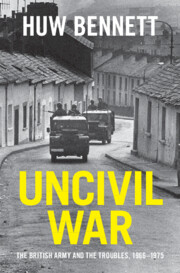Book contents
- Uncivil War
- Cambridge Military Histories
- Uncivil War
- Copyright page
- Dedication
- Contents
- Figures
- Maps
- Tables
- Illustrations
- Abbreviations
- Introduction
- 1 Baggage
- 2 The Army’s Short-Lived Ulster Honeymoon
- 3 Escalation and the Erosion of Impartiality
- 4 Edward Heath’s Bid for Victory
- 5 The Road to Bloody Sunday
- 6 The Most Deadly Year
- 7 Strategy in the Shadow of Loyalist Power
- 8 We Cannot Envisage Peace
- Conclusion
- A Note on Sources
- Acknowledgements
- Notes
- Bibliography
- Index
2 - The Army’s Short-Lived Ulster Honeymoon
Published online by Cambridge University Press: 03 August 2023
- Uncivil War
- Cambridge Military Histories
- Uncivil War
- Copyright page
- Dedication
- Contents
- Figures
- Maps
- Tables
- Illustrations
- Abbreviations
- Introduction
- 1 Baggage
- 2 The Army’s Short-Lived Ulster Honeymoon
- 3 Escalation and the Erosion of Impartiality
- 4 Edward Heath’s Bid for Victory
- 5 The Road to Bloody Sunday
- 6 The Most Deadly Year
- 7 Strategy in the Shadow of Loyalist Power
- 8 We Cannot Envisage Peace
- Conclusion
- A Note on Sources
- Acknowledgements
- Notes
- Bibliography
- Index
Summary
Chapter 2 explains how the British Army’s ‘honeymoon’ period in Northern Ireland came to an end by May 1970, and how these early months entrenched certain ideas about nationalist and unionist communities in British strategic thinking. The chapter argues the army succeeded in partially repairing trust between Catholics and the state, but that this proved highly destabilising. Strategists under-estimated lingering anger over the events in August 1969 and exaggerated their ability to control tensions. The decision to concentrate soldiers in predominantly Catholic areas and leave the police in Protestant areas gradually made the army appear biased. Tougher action, when it came, looked like it was happening only against one section of the community, whilst the army’s ability to understand Protestant militants was limited and strategists in any case wished to avoid any confrontation from that quarter. The Provisional IRA’s offensive began around Easter 1970, before the British Army adopted a more aggressive stance. By permitting provocative Protestant marches in Belfast the British began to lose the Catholic goodwill so carefully gained by army battalions in the preceding months. The British response to rising republican violence can only be understood in the context of the expectations about loyalist reactions.
- Type
- Chapter
- Information
- Uncivil WarThe British Army and the Troubles, 1966–1975, pp. 38 - 65Publisher: Cambridge University PressPrint publication year: 2023

